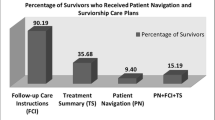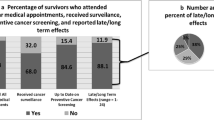Abstract
Purpose
The purpose of this study is to examine reporting of treatment summaries and follow-up instructions among cancer survivors.
Methods
Using the 2010 National Health Interview Survey, we created logistic regression models among cancer survivors not in treatment (n = 1,345) to determine characteristics associated with reporting treatment summaries and written follow-up instructions, adjusting for sociodemographic, access, and cancer-related factors. Findings are presented for all survivors and those recently diagnosed (≤4 years). We also examined unadjusted associations between written instructions and subsequent surveillance and screening.
Results
Among those recently diagnosed, 38 % reported receiving treatment summaries and 58 % reported written instructions. Among all survivors, approximately one third reported summaries and 44 % reported written instructions. After adjustment, lower reporting of summaries was associated with cancer site, race, and number of treatment modalities among those recently diagnosed, and white vs. black or Hispanic race/ethnicity, breast vs. colorectal cancer, >10 vs. ≤5 years since diagnosis, no clinical trials participation, and better than fair health among all survivors. For instructions, lower reporting was associated with no trials participation and lower income among those recently diagnosed, and increasing age, white vs. black race, lower income, >10 vs. ≤5 years since diagnosis, 1 vs. ≥2 treatment modalities, no trials participation, and at least good vs. fair/poor health among all survivors. Written instructions were associated with reporting provider recommendations for breast and cervical cancer surveillance, and recent screening mammograms.
Conclusion
Many recently diagnosed cancer survivors did not report receiving treatment summaries and written follow-up instructions. Opportunities exist to examine associations between use of these documents and recommended care and outcomes, and to facilitate their adoption.
Implications for cancer survivors
Cancer survivors who have completed therapy should ask their providers for treatment summaries and written follow-up instructions, and discuss with them how their cancer and therapy impact their future health care.
Similar content being viewed by others
References
Altekruse SF, Kosary CL, Krapcho M, Neyman N, Aminou R, Waldron W, et al. SEER Cancer Statistics Review, 1975–2008, National Cancer Institute. Bethesda, MD, http://seer.cancer.gov/csr/1975_2007/, based on November 2010 SEER data submission, posted to SEER web site, 2011.
Cancer survivors—United States, 2007. MMWR Morb Mortal Wkly Rep. 2011; 60:269–272.
Mariotto AG, Rowland JH, Ries LAG, Scoppa S, Feuer EJ. Multiple cancer prevalence:a growing challenge in long-term survivorship. Cancer Epidemiol Biomarkers Prev. 2007;16:566–71.
Ganz PA. Late effects of cancer and its treatment. Semin Oncol Nurs. 2001;17:241–8.
Earle CC. Failing to plan is planning to fail: improving the quality of care with survivorship care plans. J Clin Oncol. 2006;24:5112–6.
Hewitt ME, Weiner SL, Simone JV. Childhood cancer survivorship: improving care and quality of life. Washington, DC: National Academies Press; 2003.
Doroshow JH. Doxorubicin-induced cardiac toxicity. N Engl J Med. 1991;324:843–5.
Earle CC. Long term care planning for cancer survivors:a health services research agenda. J Cancer Surviv. 2007;1:64–74.
Erikson C, Salsberg E, Forte G, Bruinooge S, Goldstein M. Future supply and demand for oncologists:challenges to assuring access to oncology services. J Oncol Pract. 2007;3:79–86.
Ganz PA. Survivorship:adult cancer survivors. Prim Care. 2009;36:721–41.
Pollack LA, Adamache W, Ryerson AB, Eheman CR, Richardson LC. Care of long-term cancer survivors: physicians seen by Medicare enrollees surviving longer than 5 years. Cancer. 2009;115:5284–95.
Hewitt ME, Greenfield S, Stovall E. From cancer patient to cancer survivor: lost in transition. Washington, DC: National Academies Press; 2006.
Bober SL, Recklitis CJ, Campbell EG, Park ER, Kutner JS, Najita JS, et al. Caring for cancer survivors:a survey of primary care physicians. Cancer. 2009;115:4409–18.
Kantsiper M, McDonald EL, Geller G, Shockney L, Snyder C, Wolff AC. Transitioning to breast cancer survivorship:perspectives of patients, cancer specialists, and primary care providers. J Gen Intern Med. 2009;24 Suppl 2:S459–66.
Potosky AL, Han PK, Rowland J, Klabunde CN, Smith T, Aziz N, et al. Differences between primary care physicians’ and oncologists’ knowledge, attitudes and practices regarding the care of cancer survivors. J Gen Intern Med. 2011;26:1403–10.
Mertens AC, Cotter KL, Foster BM, Zebrack BJ, Hudson MM, Eshelman D, et al. Improving health care for adult survivors of childhood cancer: recommendations from a delphi panel of health policy experts. Health Policy. 2004;69:169–78.
Miedema B, MacDonald I, Tatemichi S. Cancer follow-up care. Patients’ perspectives. Can Fam Physician. 2003;49:890–5.
Hewitt ME, Ganz PA. Implementing cancer survivorship care planning: workshop summary. Washington, DC: National Academies Press; 2007.
Reuben SH. Living beyond cancer: finding a new balance. President’s Cancer Panel 2003–2004 Annual Report. U.S. Department of Health and Human Services, National Institutes of Health, National Cancer Institute; 2004.
CDC. A national action plan for cancer survivorship: advancing public health strategies. Atlanta GA: CDC; 2004. Available at http://www.cdc.gov/cancer/survivorship/pdf/plan.pdf
National Center for Health Statistics. Data File Documentation, National Health Interview Survey, 2010 (machine readable data file and documentation). Hyattsville: National Center for Health Statistics, Centers for Disease Control and Prevention; 2011.
Harrell FE. Regression modeling strategies: with applications to linear models, logistic regression, and survival analysis. New York: Springer; 2001.
Frank E Harrell Jr, with contributions from many other users. Hmisc. Harrell Miscellaneous. R package version 3.7-0; 2009.
R Development Core Team. R: A language and environment for statistical computing. Vienna: R Foundation for Statistical Computing; 2009.
Park SM, Park CT, Park SY, Bae DS, Nam JH, Cho CH, et al. Factors related to second cancer screening practice in disease-free cervical cancer survivors. Cancer Causes Control. 2009;20:1697–703.
Wilson SE, Andersen MR, Meischke H. Meeting the needs of rural breast cancer survivors: what still needs to be done? J Women Health Gen B. 2000;9:667–77.
Earle CC, Neville BA. Under use of necessary care among cancer survivors. Cancer. 2004;101:1712–9.
Earle CC, Burstein HJ, Winer EP, Weeks JC. Quality of non-breast cancer health maintenance among elderly breast cancer survivors. J Clin Oncol. 2003;21:1447–51.
Snyder CF, Frick KD, Peairs KS, Kantsiper ME, Herbert RJ, Blackford AL, et al. Comparing care for breast cancer survivors to non-cancer controls: a five-year longitudinal study. J Gen Intern Med. 2009;24:469–74.
Kadan-Lottick NS, Robison LL, Gurney JG, Neglia JP, Yasui Y, Hayashi R, et al. Childhood cancer survivors’ knowledge about their past diagnosis and treatment: childhood cancer survivor study. JAMA. 2002;287:1832–9.
Schappert SM, Burt CW. Ambulatory care visits to physician offices, hospital outpatient departments, and emergency departments: United States, 2001–02. National Center for Health Statistics. Vital Health Stat. 2006;13:1–73.
Onega T, Duell EJ, Shi X, Demidenko E, Goodman DC. Race versus place of service in mortality among medicare beneficiaries with cancer. Cancer. 2010;116:2698–706.
Grunfeld E, Levine MN, Julian JA, Coyle D, Szechtman B, Mirsky D, et al. Randomized trial of long-term follow-up for early-stage breast cancer:a comparison of family physician versus specialist care. J Clin Oncol. 2006;24:848–55.
Oeffinger KC, Hudson MM, Mertens AC, et al. Increasing rates of breast cancer and cardiac surveillance among high-risk survivors of childhood Hodgkin lymphoma following a mailed, one-page survivorship care plan. Pediatr Blood Cancer. 2010;56:818–24.
Hewitt M, Breen N, Devesa S. Cancer prevalence and survivorship issues: analyses of the 1992 National Health Interview Survey. J Natl Cancer Inst. 1999;91:1480–6.
Acknowledgments
The authors acknowledge Lisa Richardson for reviewing cancer treatment and cervical cancer surveillance definitions.
Conflict of interest
The authors report no conflicts of interest.
Disclaimers
The findings and conclusions in this report are those of the authors and do not necessarily represent the official position of the Centers for Disease Control and Prevention or the National Cancer Institute.
Author information
Authors and Affiliations
Corresponding author
Rights and permissions
About this article
Cite this article
Sabatino, S.A., Thompson, T.D., Smith, J.L. et al. Receipt of cancer treatment summaries and follow-up instructions among adult cancer survivors: results from a national survey. J Cancer Surviv 7, 32–43 (2013). https://doi.org/10.1007/s11764-012-0242-x
Received:
Accepted:
Published:
Issue Date:
DOI: https://doi.org/10.1007/s11764-012-0242-x




